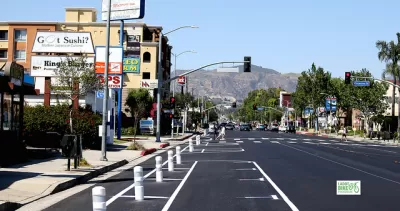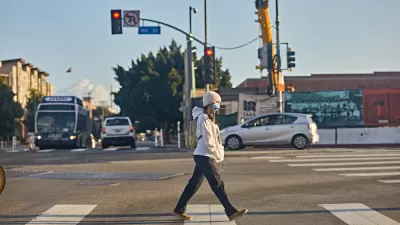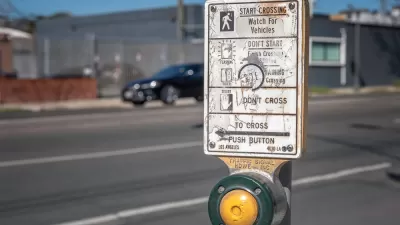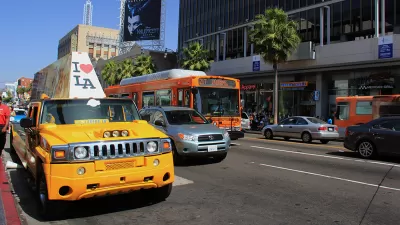The city has made almost no progress on the mobility plan it adopted in 2015. Now, voters will decide whether, and how, L.A. will have to follow through.

Los Angeles voters will decide whether the city will have to follow its own mobility plan, reports Ryan Fonseca for LAist. Fonseca outlines the plan’s history and the lack of progress made by the city on meeting its goals, as well as the unanimous decision by the city council to put the plan on the 2024 ballot.
“Initially adopted in 2015, the city’s plan calls for a dynamic shift in how L.A. manages its streets. Basically, the goal is to start prioritizing safe space for people walking, biking and taking transit, which would break from decades of catering to car traffic.” The plan also identified thousands of miles of streets that need upgrades.
However, Fonseca explains, “L.A. leaders acknowledge that in seven years, roughly 3% of the street miles identified for improvements have been upgraded. At that pace, less than 10% of the plan would be done by its 2035 target (follow that rate to 100% and you’d be very much dead by the time L.A. completed the plan).”
Now, a coalition of community groups has gathered signatures in support of a proposed ordinance, the Los Angeles Safe Streets for All Initiative, that “would require the city to add upgrades to the street sections identified in its Mobility Plan 2035 when it repaves or modifies 1/8 of a mile or more of those roadways (certain work like fixing potholes or emergency repairs are exempt).” Meanwhile, a competing proposed ordinance “uses the Healthy Streets LA ordinance as a framework, but includes its own provisions to address concerns about equitable rollout and funding.”
The article details the disparities between traffic violence rates among the city’s neighborhoods and racial groups. “A 2020 UCLA study found Black Angelenos represented 16% of all traffic fatalities between 2013 and 2017, nearly double their share of the city's population.” Advocates concerned about equity say the proposed ordinance rushes a plan that has not done enough to address the high rates of crashes and deaths in the city’s most underinvested neighborhoods.
According to Fonseca, “Council President Martinez, who represents the central San Fernando Valley, and several other councilmembers vowed to keep meeting with Healthy Streets LA and mobility advocates who opposed their ordinance to hopefully reach a compromise that pleases everyone before the decision is made by voters in roughly 19 months.”
FULL STORY: Will LA Follow Through On Its Mobility Plan? Voters Could Decide That In 2024

Maui's Vacation Rental Debate Turns Ugly
Verbal attacks, misinformation campaigns and fistfights plague a high-stakes debate to convert thousands of vacation rentals into long-term housing.

Planetizen Federal Action Tracker
A weekly monitor of how Trump’s orders and actions are impacting planners and planning in America.

In Urban Planning, AI Prompting Could be the New Design Thinking
Creativity has long been key to great urban design. What if we see AI as our new creative partner?

King County Supportive Housing Program Offers Hope for Unhoused Residents
The county is taking a ‘Housing First’ approach that prioritizes getting people into housing, then offering wraparound supportive services.

Researchers Use AI to Get Clearer Picture of US Housing
Analysts are using artificial intelligence to supercharge their research by allowing them to comb through data faster. Though these AI tools can be error prone, they save time and housing researchers are optimistic about the future.

Making Shared Micromobility More Inclusive
Cities and shared mobility system operators can do more to include people with disabilities in planning and operations, per a new report.
Urban Design for Planners 1: Software Tools
This six-course series explores essential urban design concepts using open source software and equips planners with the tools they need to participate fully in the urban design process.
Planning for Universal Design
Learn the tools for implementing Universal Design in planning regulations.
planning NEXT
Appalachian Highlands Housing Partners
Mpact (founded as Rail~Volution)
City of Camden Redevelopment Agency
City of Astoria
City of Portland
City of Laramie





























